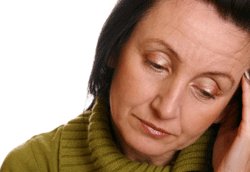 |
||||
Insomnia And Menopause: Why Menopausal Insomnia Can Affect Your WeightDid you know that getting good sleep is an important part of your strategy for beating menopausal weight gain? Researchers have found that after a poor night's sleep, you're more likely to be extra-hungry and to crave carbohydrates and sweet, fatty foods. What's more, insomnia affects your metabolism, and if you regularly go short of sleep you'll be more likely to put on weight. Why Is Insomnia In Menopause A Problem?
Your body perceives a lack of sleep as a stressor, and responds by releasing more of the hormone cortisol, which encourages your body to store excess fat around your midriff. Lack of sleep also makes you tend to feel hungry, even if you've actually eaten enough to satisfy your appetite. If you've slept badly, don't you find yourself reaching for a doughnut or cookie to help you through the morning? That's why a pattern of insomnia during menopause can be so bad for your waistline. Sleep loss in perimenopausal insomniahas other hormonal effects which make it harder for your body to lose fat and build muscle. It also affects your body's efficiency in burning carbohydrates, making it more likely that you'll store these as fat and raising your blood sugar levels. High blood sugar can lead to serious health problems, including type 2 diabetes, heart and circulatory problems and obesity. Feeling tired also affects your energy levels, which means you're less likely to be active, and so you won't be burning as many calories in a day as you would if you were fully rested. All these are very important reasons to avoid insomnia in menopause, and try to get a good night's sleep, regularly. What Causes Insomnia During Menopause?Hot flashes and night sweats are the most common causes of broken sleep in menopause. Research done as part of the SWAN Study (Study of Women's Health Across the Nation), found that over 40% of women in the menopausal transition woke frequently during the night, and 16% had trouble falling asleep. If you have heat disturbances during the night, talk to your doctor about what remedies you could try to reduce these menopause signs.Even if you're not troubled with night-time overheating, don't make the mistake of thinking that you'll achieve more if you cut down on the hours you sleep. Your body needs sufficient rest to function well, so make getting a good night's sleep a priority. Handling Insomnia And Menopause
Insomnia and menopause can affect your attempts to lose weight, so try these simple strategies and tackle any health issues that could be affecting your sleep. Good sleep is essential to your menopausal wellbeing. Return from Insomnia And Menopause to Beat Menopause Weight Gain. |
OUR FREE REPORT!
Get the Healthy Eating Habit and Lose Weight For Ever 
We hate spam and will never give away or sell your email address Can HRT help insomnia and menopause?"Although we found some evidence that hormonal therapy could benefit these menopausal sleep related symptoms, this was not a consistent finding across all groups compared, so the role for this particular treatment needs more study." Dr Howard Kravitz, Associate Professor of Psychiatry and Preventive Medicine at Rush University Medical Center and a principal investigator of the SWAN study. |
|||
|
|
||||
FEEL GOOD IN YOUR BODY!Beat-menopause-weight-gain.com does not offer medical advice. Please consult your physician before making any changes to your usual lifestyle.View our Terms of Use and Privacy Policy |
||||
|
Beat Menopause Weight Gain - Feel Good in Your Body! - All Rights Reserved - Copyright© 2008-2012
| ||||



